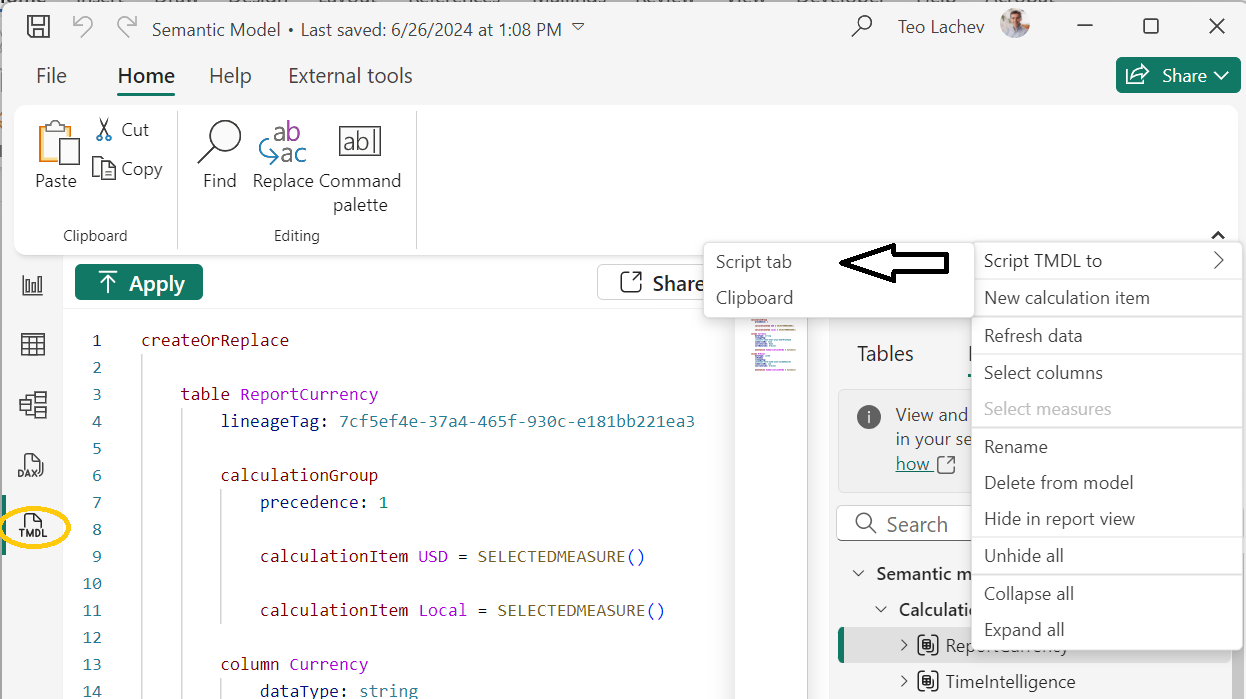-
Atlanta Microsoft BI Group Meeting on May 5th (Optimize Power BI Reports and Semantic Models Using External Tools)
April 29, 2025 / No Comments »

Atlanta BI fans, please join us in person for our next meeting on Monday, May 5th at 18:30 ET. Lakshmana R Boya will show us how to optimize Power BI reports by identifying the performance and size issues using “Measure Killer” community app. Your humble correspondent will walk you through some of the Power BI and Fabric enhancements of late. For more details and sign up, visit our group page. Delivery: In-person Level: Intermediate Food: Pizza and drinks will be provided Agenda: 18:15-18:30 Registration and networking 18:30-19:00 Organizer and sponsor time (news, Power BI latest, sponsor marketing) 19:00-20:15 Main presentation 20:15-20:30 Q&A Overview: We will deep dive into how we can optimize Power BI reports and semantic models by identifying the performance and size issues using the “Measure Killer” app. Sponsor: Prologika (https://prologika.com) helps organizations of all sizes to make sense of data by delivering tailored BI solutions that...
-
Two Takeaways from FabCon 2025
April 4, 2025 / No Comments »

The 2025 Fabric Community conference has just concluded. There were many announcements but I found two of them intriguing to make a case for Fabric more compelling should a suitable project comes around: OneSecurity – Analysis Services Tabular and Power BI semantic models have long supported a comprehensive and flexible row-level security (RLS), such as to support scenarios requiring dynamically denying rows. Unfortunately, column-level security (aka object-level security) has been less flexible as I explain in more detail here. I hope OneSecurity will prove more flexible over time. Currently, it doesn’t support dynamic security, but I hope it eventually will, such as by allowing a SELECT statement to evaluate runtime conditions. So, keep an eye out for OneSecurity as it evolves over time if you face more complex column-level security requirements. Copilots for all F SKUs – Previously, I complained that Microsoft has established that AI must require premium pricing...
-
Atlanta Microsoft BI Group Meeting on April 7th (Source Control for Power BI)
April 1, 2025 / No Comments »

Atlanta BI fans, please join us in person for our next meeting on Monday, April 7th at 18:30 ET. Neel Pathak will explain how to do source control for Power BI with Git integration. Your humble correspondent will walk you through some of the Power BI and Fabric enhancements of late. For more details and sign up, visit our group page. Presentation: Source Control for Power BI Delivery: In-person Level: Intermediate Food: Pizza and drinks will be provided Agenda: 18:15-18:30 Registration and networking 18:30-19:00 Organizer and sponsor time (news, Power BI latest, sponsor marketing) 19:00-20:15 Main presentation 20:15-20:30 Q&A Overview: The days of sharing pbix files and copying in changes are gone. Git integration now enables development teams to collaborate and provides version control/rollbacks. Speaker: Neel Pathak (Senior Consultant with 3Cloud) a BI and analytics professional with an expertise in Power BI and guiding clients through their analytics transformation journeys. Sponsor: 3Cloud is the #1...
-
Hacking Adventures: Automating Button Click
March 15, 2025 / No Comments »

Sometimes you may encounter annoying training content that forces you to watch a section before you can explicitly advance to the next one. Never understood why I have to do this or sit for long trainings altogether if I already know the answers and can pass the naive quizzes. Usually, a web button to continue gets enabled after you watch a video or after some time elapses. With some investigative work and low-code JavaScript, you can easily "automate" the process to some extent, such as until it's time for the quiz, as follows: The trick is to find the id of the button and what makes it enabled/disabled. In the Edge browser, right click the "button" and then click Inspect. This will open the Dev Tools and you'll will see the button HTML definition. You can right-click it on the HTML code and then click Copy OuterHTML to paste it...
-
LLM Adventures: xAI Grok
February 18, 2025 / No Comments »

I’ve been recently impressed with xAI Grok compared to Microsoft Copilot. Grok performs better that Copilot which seems to be crippled with political correctness to a point of absurdity although it seems to be getting more permissive of late. But the most important Grok advantage is that it’s always recent… and it doesn’t crash every now and then. A couple of examples: Question: Where is this image from? Microsoft Copilot – what exactly is inappropriate is not clear. Grok (impressive!) - This image depicts the rock formations and cave dwellings of Cappadocia, a historical region in central Turkey. The unique rock structures and the cave homes carved into them are iconic features of this area, particularly around the town of Göreme. Question: What are the most important political events to watch for tomorrow (as of 2/18/2025)? Microsoft Copilot (chaos of past and current events): Presidential Primaries: Former President Donald Trump...
-
Atlanta Microsoft BI Group Meeting on February 3rd (Fabric Warehouse vs. Fabric Lakehouse)
January 28, 2025 / No Comments »

Atlanta BI fans, please join us in person for our next meeting on Monday, February 3rd at 18:30 ET. Jeff Levy (Data Architect @ Protiviti) will present the core concepts, architectures, and use cases of the Fabric Warehouse and Fabric Lakehouse. Your humble correspondent will walk you through the most significant Power BI and Fabric enhancements of late. For more details and sign up, visit our group page. Presentation: Fabric Warehouse vs. Fabric Lakehouse: Choosing the Right Architecture for Your Environment Delivery: In-person Level: Intermediate Food: Pizza and drinks will be provided Agenda: 18:15-18:30 Registration and networking 18:30-19:00 Organizer and sponsor time (news, Power BI latest, sponsor marketing) 19:00-20:15 Main presentation 20:15-20:30 Q&A Overview: The modern data landscape demands scalable, flexible, and efficient architectures to support diverse business needs. With Microsoft Fabric, two leading paradigms have emerged to address these challenges: the Fabric Warehouse and the Fabric Lakehouse. While both tools aim to...
-
TMDL View in Power BI Desktop
January 22, 2025 / No Comments »

I had the privilege to participate in the early preview program of the new TMDL View in Power BI Desktop which is currently in public preview in the latest January release of Power BI Desktop. Without reiterating what was said in the announcement, I’d like to mention three main benefits of this feature: Ability to access the entire model metadata - This includes features don’t have User interface in Power BI Desktop. Traditionally, BI developers have been relying on Tabular Editor to do so. Now you have another option although it requires knowing the TMLDL language. Alas, TMLD doesn’t come with user interface although it does support Autocomplete. Ability to copy specific model features from one Power BI Desktop file to another - For example, in the screenshot below, I have scripted a calculation group. Now, I can open another Power BI Desktop file, copy the script and apply it....
-
Handling Data Quality and Data Enrichment
December 7, 2024 / No Comments »

Some of the most difficult and tedious issues in almost every BI project are handling data quality issues (aka exceptions) and data enrichment. Examples of data quality issues typically originate from wrong data entries or violated business rules, such as misspelled and misclassified products. Data enrichment tasks may go beyond the design of the original data source, such as introducing new taxonomies for products or customers. In a recent project, a client needed guidance on where to handle data quality and enrichment processes. Like cakes and ogres, a classic BI solution has layers. Starting upstream in the data pipeline and moving downstream are data sources, ODS (data staging and change data tracking), EDW (star schema) and semantic models. In general, unless absolutely necessary, I'm against master data management (MDM) systems because of their complexity and cost. Instead, I believe that most data quality and enrichment tasks can be addressed efficiently...
-
LLM Adventures: Microsoft Copilot Studio (The Good, The Bad, and The Ugly)
November 28, 2024 / No Comments »

"A momentary lapse of reason That binds a life to a life You won't regret, you will never forget There'll be no sleep in here tonight" "The Slip", Pink Floyd Happy Thanksgiving! What a better way for me to spend a Thanksgiving week than doing more AI? After a year of letting it (and other Microsoft LLM offerings) simmer and awaken by the latest AI hoopla from the Ignite conference, I took another look at Microsoft Copilot Studio. For the uninitiated, Copilot Studio lets you implement AI-powered smart bots (“agents”) for deriving knowledge from documents or websites. Basically, you can view the relationship of Copilot Studio to Retrieval-augmented Generation apps as what Power BI is to self-service BI. Copilot Studio licensing starts at $200 per month for up to 25,000 messages (interactions between user and agent) although at Ignite Microsoft hinted that pay-as-you-go licensing will be coming. The Good A...
-
Atlanta Microsoft BI Group Meeting on December 2nd (Semantic Modeling as Code)
November 26, 2024 / No Comments »

Atlanta BI fans, please join us online for our next meeting on Monday, December 2nd at 5PM ET (please note the change to our usual meeting time to accommodate the presenter). Rui Romano (Product Manager at Microsoft) will discuss how the new TMDL language for Power BI models can unlock new scenarios that previously weren't possible. For more details and sign up, visit our group page. Presentation: "Semantic Modeling as Code" with TMDL using Power BI Desktop Developer Mode (PBIP) and VS Code Delivery: Online Level: Intermediate to Advanced Overview: The landscape for developing enterprise-scale models has never been more exciting than it is now! Developer mode in Power BI Desktop and the new TMDL language unlock new scenarios that previously weren't possible, such as great source control and co-development experiences with Git integration. Additionally, the TMDL Visual Studio Code extension offers a new, powerful and efficient, code-first semantic modeling experience....

 We offer onsite and online Business Intelligence classes! Contact us about in-person training for groups of five or more students.
We offer onsite and online Business Intelligence classes! Contact us about in-person training for groups of five or more students.



